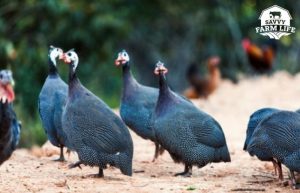
How Many Guinea Should I Get?
Guinea fowl belong to the poultry category of farm animals, just like chickens! They can provide excellent chemical-free pest control as well as hatch tasty, albeit small, eggs. Guinea fowl are extremely social animals, which means you have to have multiple in order to avoid isolation-induced depression. This leads many to ask the question:
How many guinea fowl should I get? The exact number depends on the amount of space you have for the guinea fowl as well as whether or not you’re looking to breed them. Generally speaking, you should buy at least 5-10 birds in order to provide an adequate social community for your guineas. The larger the group, the more the birds will feel secure and protected.
Guinea fowl are social birds due to their status as prey animals. They often fall victim to the attacks of predators like dogs, foxes, cats, and Birds of Prey. Living in a flock provides them with more opportunity to sense danger as it approaches. Keep reading to learn more about how many guinea fowl you should have!
Guidelines for Determining How Many Guinea Fowl to Get
If you’re purchasing guinea fowl to provide low-cost, low-maintenance pest control for your crops and other animals, it’s best to start with a small flock. A small flock can consist of around five to ten birds.
The reason you’ll want to invest in five to ten birds is to provide your Guinea Fowl with a good social setting. When we first got our Guinea Fowl, I was surprised at how tightly knit the group of fowl seemed to be. They would always stay side by side, only ever a few feet away from each other. If one bird started moving, they all started moving.
Guinea Fowl rely heavily on their flock for protection and security. Unfortunately, Guinea Fowl don’t have the best senses and they’re not that smart, so they make easy targets for predators. By forming a tight formation, these birds are less likely to be attacked and they can also watch out for each other when in closer range.
How Many Guinea Fowl Is My Land Suitable For?
Guinea fowl are social birds who gravitate towards each other when it comes to pretty much anything they do. But, like most animals, they also need their space. When kept in a confined setting like a coop or a shelter, each guinea fowl requires between two to four square feet of space. If you keep them in a covered pen, I recommend 10 – 15 square feet per bird so they can browse and roam. Let’s discuss some of the necessary resources that you will need that will determine how many guinea fowl you should purchase.
Guinea Fowl Will Need Shelter
Guinea fowl are usually left to fend for themselves in the wild, so keeping them in a coop or an enclosure is unnatural for them. However, if trained from a young age, guinea fowl can learn to return to a coop at night and even live in an enclosure. A coop can provide your birds will protection during the night. If you are trying to hatch eggs for breeding or consumption, you will need nesting boxes that can be conveniently placed inside of a coop or barn. (Want to learn more about keeping guinea fowl in a coop? Check out my article Do Guinea Fowl Need a Coop? Essential Care Guide.)
Guinea Fowl Can Fly
Guineas, unlike chickens, are very adept flyers who can fly up to 400 to 500 feet at a time. The best way to prevent them from flying away from your farm is to purchase your first flock when they are still young meets (baby guineas). This will allow you to shape their behaviors and adequately adapt them to your farm’s individual environment, like keeping them in a covered pen.
While guinea fowl can fly, they are often easily susceptible to predator attacks. For extra protection, it is never a bad idea to create an enclosed, outdoor area for the guinea flock. A large, outdoor enclosure will help you to control the guinea fowls’ airspace without restricting their ability to fly freely.
To reiterate, the guinea fowls need an ample amount of space in order to lead healthy, happy lives, so you should make sure that your farm can handle the size flock you’d like to purchase before you buy. As a good rule of thumb, keep two to three square feet of space for the guinea fowl inside a coop, barn, or shed and about four square feet of space per each guinea in an outdoor enclosure (that’s fenced in overhead as well).
Can I Own Only One Guinea Fowl?

If you’re thinking of owning only one guinea fowl, I would not recommend it. As previously mentioned, guinea fowl are extremely social birds, which means that they thrive in larger flocks. A singular guinea fowl will become lonely, which results in them becoming stressed. A flock of guinea fowl can also provide each bird with peace, security, and comfort. As prey animals, guinea fowl live in a flock to ward of predator attacks.
Guineas are highly communicative birds; remember what I said in the beginning about them acting as “watchdogs” on the farm and alerting you of suspicious activity? Well, they are also extremely effective at communicating their own distress with loud calls. What I’m trying to say here is that if you only buy one guinea fowl, you will never hear the sweet sound of silence again. Without a flock, one guinea will be on high alert all the time, which will lead them to always being noisy.
You can save yourself a lot of time and trouble by purchasing a small flock of guinea fowl instead of a singular guinea. You will also have happier guinea fowl living on your farm, so really it’s a win-win for both you and the guineas.
Knowing the specific needs of your guinea fowl can help you take better care of them; to know more, check my article How to Care For Guinea Fowl: Ultimate Guide For Beginners.
Can I Get Only Two Guinea Fowl; A Male and a Female for Breeding?
Yes, you can just get a male and a female guinea fowl if you intend to breed them. However, guinea hens can lay up to 100 eggs per laying season. Chickens usually lay about 250 eggs per season, which means that you need more than one guinea hen to equal the amount of eggs an average chicken lays. Add to this the keets’ sensitivity after hatching and you’re definitely working against the odds by getting only two guinea fowl.
As I’ve mentioned before, guinea fowl are social animals, which means that although they would be alright with a partnership of only two, they prefer to travel and live with a flock. Keeping a flock of guinea fowl on your farm more closely replicates their natural environment, and can act as a preventative measure in case something happens to one of the guineas.
In addition to this, if you decide to purchase your guinea fowl as one-day-old keets, you will be saving yourself a lot of trouble rather than buying a whole flock at once. Previously in this post, I talked about how raising young keets allows you to shape their behavior and adjust them to your farm’s environment. Think of it like this: it’s far easier to instill good table manners in a child than it is to re-teach a grown adult to not eat with his hands. Guinea fowl follow this same logic.
When we purchased our first Guinea Fowl flock, we purchased ten keets. We raised the fowl to free-range, which they did together all over our property. The birds were happy together and would explore much more of the pastures this way. At one point in time, we did only have one Guinea Fowl after his buddies died, and he refused to roam in fear of getting eaten. Instead, he would stay close to the chickens in the chicken pen.
Why Should You Purchase Guinea Fowl?
There are many reasons someone would choose to purchase guinea fowl for their farm. Not only do they produce rich and tasty eggs, but they are also naturally inclined to eat insects such as ticks, locusts, spiders, beetles, cockroaches, and ants.
In addition to this, guinea fowl are very vocal birds, which means they can provide a real-time farm security alarm. These birds will alert you when anything strange or unusual happens on the surrounding area of your farm, though they will also most likely alert you when cars are driving by or packages are being delivered. Because of this, it’s best to have the watchdog aspect of the fowl as a “bonus” instead of your sole reasoning for buying the fowl.
Lastly, you can also raise Guinea Fowl for meat. While guinea meat is a rarity in restaurants and meat shops, you can eat it. Guinea Fowl meat is known to be slightly more gamier that chicken, but still yummy!
If you’re interested in knowing more about guinea fowl, check out my article How Long Guinea Fowl Live & Other Interesting Facts.
